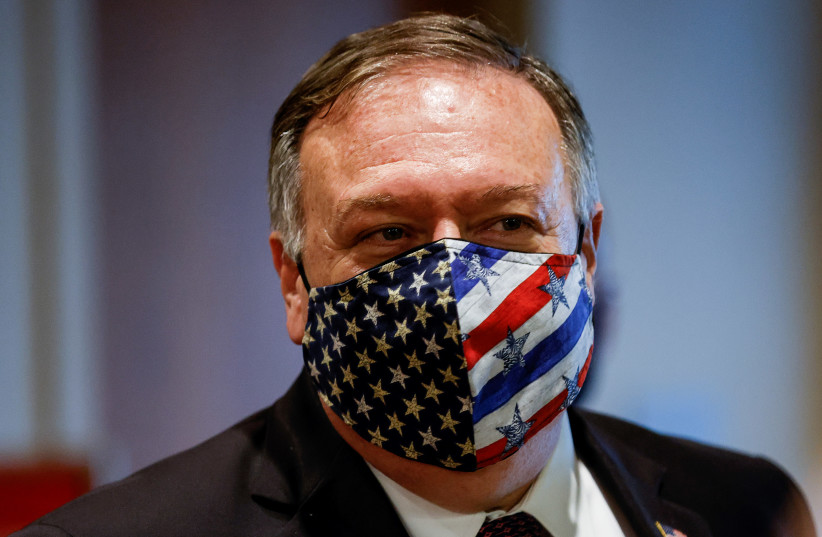Pompeo’s trip comes in advance of a planned visit next Monday to the UAE by an official Israeli delegation led by National Security Adviser Meir Ben Shabbat.

US Secretary of State Mike Pompeo returned to Washington on Thursday after a whirlwind four-day trip to the Middle East, in which he was greeted with handshakes and smiles but received no further affirmations from Arab leaders with regard to normalized ties with Israel.
“The Omani people are so warm and generous. I’m grateful for our strong partnership. Thanks to Omani Sultan Haitham bin Tarik Al Said for our steadfast friendship,” Pompeo wrote in an upbeat tweet from the Omani capital of Muscat on Thursday.
In an earlier tweet, he said the two had discussed “the importance of building regional peace, stability and prosperity through a united Gulf Cooperation Council.”
Pompeo arrived in the region in the aftermath of the dramatic announcement two weeks ago that Israel and the UAE planned to normalize ties. He visited Israel on Monday and the UAE on Wednesday.
An Israeli delegation led by National Security Adviser Meir Ben-Shabbat plans to visit the UAE next Monday.
There was media speculation that El Al would take the Israeli delegation and fly over Saudi territory for the first time. El Al denied the report.
US National Security Council Adviser Robert O’Brien also plans to head to the UAE next week, together with US Special Adviser Jared Kushner, US Special Representative for International Negotiations Avi Berkowitz and Special Representative for Iran Brian Hook.
Pompeo also visited Sudan, Oman and Bahrain, which are expected to follow the UAE in normalizing ties with Israel. During his visit, however, none of them gave a nod in that direction.
Sudanese Prime Minister Abdalla Hamdok on Tuesday said he was not mandated to normalize ties with Israel and asked that the issue not be linked to discussions with the US on the country’s removal from the list of state sponsors of terrorism.
In Bahrain on Wednesday, Pompeo failed to secure a statement from Crown Prince Salman bin Hamad Al Khalifa about normalized ties with Israel.
The US is ready to assist in the normalization of ties between Bahrain and Israel if needed, a senior US State Department official said during the Bahrain leg of the trip.
“If we can help facilitate normalization with Bahrain, we’re ready,” the official said.
Khalifa said he welcomed US efforts to achieve the Israel-UAE accord, noting “the importance of re-doubling efforts to realize a just solution which utilizes peace as a strategic option to end the Palestinian-Israeli conflict,” state news agency BNA reported.
Saeb Erekat, secretary-general of the PLO Executive Committee, tweeted his appreciation of Bahrain’s comments, thanking it for insisting that there must first be peace between Israel and the Palestinians, and only then can normalizing ties with the Arab world occur. This includes the idea of a two-state solution at the pre-1967 lines with east Jerusalem as its capital, he said.
The Trump administration’s peace plan does not stipulate the pre-1967 lines.
“We highly appreciate the position of HM King Hamad Bin Issa Al Khalifa of Bahrain,” Erekat tweeted. “We hope that Mr. Pompeo will use his hearing skills. End the occupation then normalization.”
While in the Middle East, Pompeo was attacked by Democrats in the US for addressing the Republican National Convention from Jerusalem, which they said gave the appearance he was using his public office to campaign.
There were also clear tensions with Israel, about the possible US sale of the F-35 military jets to the UAE.
The trip also took Pompeo to countries that stand strong against Iran, a topic that was also part of discussions. It gave the appearance of a tightening alliance against Iran between the US, Israel and the Gulf States.
During the trip, the US continued to suffer setbacks on the international stage to curb Iran’s nuclear program, as well as to halt its aggressive regional behavior and its ability to stockpile sophisticated arms such as ballistic missiles.
On Tuesday, the UN Security Council’s president dismissed a US attempt to formally trigger a mechanism that would ensure that international sanctions against Iran were snapped back into place.
Those sanctions were lifted in 2015 under UNSC Resolution 2231 to help secure the Joint Comprehensive Plan of Action, known as the Iran nuclear deal, to curb Tehran’s nuclear power. It was signed by the US, China, Russia, France, the UK and Germany.
The US left the deal in 2018 but said it retained its rights as a permanent UNSC member to call for those sanctions to be put back in place should Iran not comply with the deal.
Currently, Iran is enriching uranium above the limits set by the deal.
On the last day of his trip, Pompeo tweeted that the UNSC president could not halt the snapback request.
“Last week, the US triggered the 30-day process to restore virtually all sanctions on Iran after the Security Council failed to uphold its mission to maintain international peace and security. These sanctions will snap back at midnight GMT on September 20,” he wrote.
“If any member of the Security Council introduces a resolution to continue sanctions relief, the US will oppose it. If no resolution is introduced, the sanctions on Iran will still return on September 20. That’s how UNSCR 2231 works,” Pompeo wrote.
As reported by The Jerusalem Post
